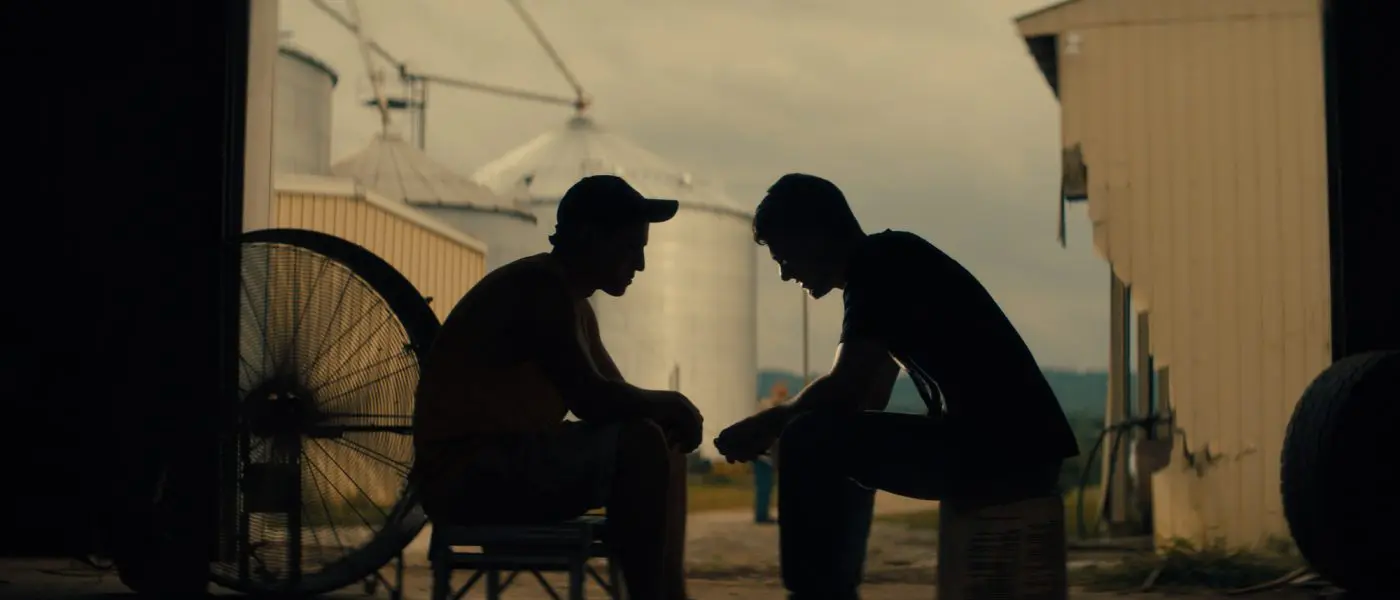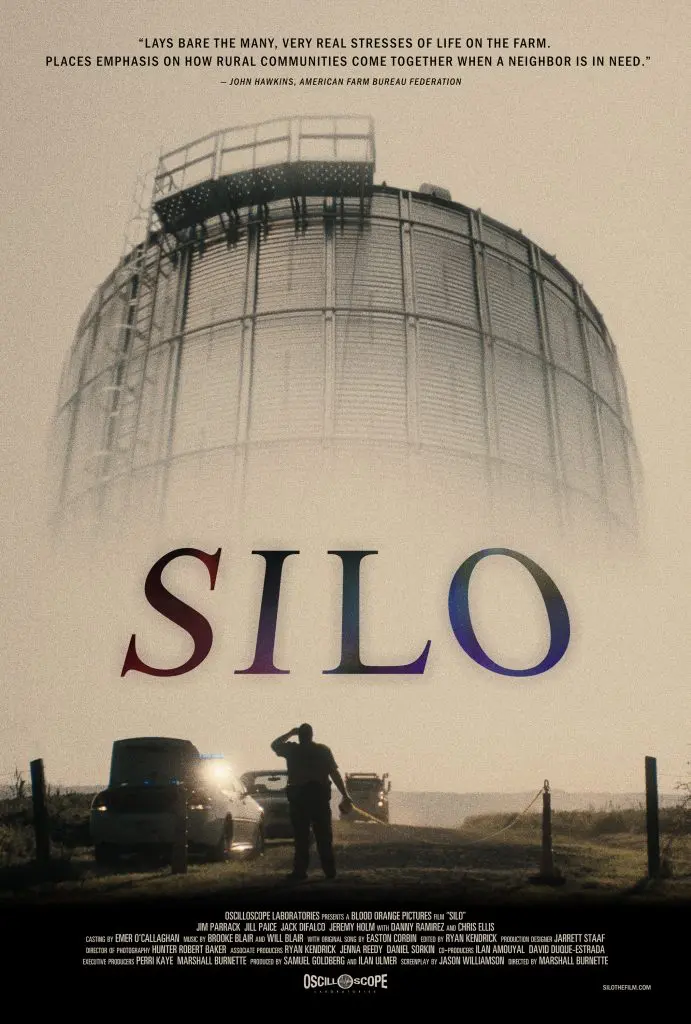Farm Aid was recently lucky enough to have a discussion with the filmmaker of Silo, a feature film about grain entrapment. The film follows the tragedy of a teenage boy working on a farm as he becomes trapped in a 50-foot grain silo and how the local community must come together to try to save him from drowning in the very grain that is their livelihood. Silo not only shines a light on the mental and physical stresses associated with agriculture, but also focuses on the universal theme of community. From our first conversation with Silo producer Samuel Goldberg – a native of New York City – it was clear that this story, which is unfortunately all-too-common, had a profound impact on him and his understanding of rural America.
Farmer stress and safety are among the issues that Farm Aid hotline operators hear every day from farmers directly. We appreciate the work that Silo has done to normalize the issue and open up the conversation among farmers and non-farmers alike to shift the narrative from one of rugged individualism to a resilient community-based system of agriculture.
Q&A with Samuel Goldberg, producer of Silo
Q: As someone who has spent a lot of time living in cities, what research was needed in order to understand and accurately represent the issue of farm safety and how did it change your perception of rural America?
My first trip to a small farm town was in May 2016. I was there to produce SILO: Edge of the Real World, a short documentary that actually predated our scripted, feature film. I was a bit nervous, knowing I’d feel like a fish out of water, because I was a city kid developing a film about farmers, a group of people I knew almost nothing about.
I was blown away by the generosity of the Fox family, based in Rising Sun, Indiana. They were kind and patient and forthcoming. And, like so many farmers I met in the five years thereafter, they expressed a feeling of abandonment by city people – this sense that we didn’t really understand them, or even want to understand them.
From that point on, I vowed I would go in open-minded to all conversations moving forward. And I have made countless friends from rural parts of this country, so many of whom exhibit patience and humility that I often find lacking in big cities.
Q: Why did you feel compelled to produce this film and how has it impacted your life?
The first thing that hooked me about SILO was the director’s pitch to me: a boy gets trapped in a 50-foot-tall grain bin and the local volunteer fire company must rescue him. Whether you know about agriculture or not, that is a really compelling movie plot!
But the more I dug deeper into this subject, the more I realized that farmers put their lives at risk every day as part of an incredibly honorable profession. And they rarely, if ever, ask for help or even thanks.
I felt, as a city kid, that it could benefit society – especially ours, one with a growing cultural and political divide – if some city kids could band together with farmers and make an authentic, empathetic film about their way of life.
Well, we did that. I spent seven years on the film. And now I live on an old farm in Pennsylvania! My life has taken many twists and turns since starting this film, but my perspective has changed greatly, and I now want to learn how to farm myself.
Q: At its core, Silo is a film about community. How do you hope to create a sense of community among farmers and non-farmers? Or as we like to say at Farm Aid, among growers and eaters.
I think heartfelt, well-researched stories about people can help build commonality between different social groups. Too often these days, movies have a mission that drives its motivation. Our motivation in making SILO was just to depict people authentically – that was all. The mission statement came later on.
The more we get to know other human beings, the more we tend to see what we have in common – not our differences. Although my upbringing could not have been more different than Adam Fox of Rising Sun, Indiana, our values, interests, worries, hopes – all of that – were so similar to one another. But if we sat behind a computer and watched the news and scrolled social media all day, you’d think we were total opposites.
My hope is that a film like SILO, and so many other heartfelt stories out there, can make us less suspicious of “the other.” And from there, perhaps our guards will drop, our hearts will open, and our country can begin to heal some of these nasty wounds we’ve got.
Q: Farm Aid firmly believes we cannot have a thriving farm and food system in America without achieving racial equity and justice. How does the inclusion of the character Lucha in the film help shine a much-needed spotlight on the diversity of farmers and farm workers?
Many of the farmers I know speak Spanish. The American farm economy would have a very difficult time subsisting and continuing without the help of foreign labor and of immigrants. That was actually a huge issue when the pandemic started, but that’s a longer story for a different time.
Lucha is a kid like any other kid. He happens to be of Latin American descent, but he’s also a teenager with ambitious hopes and dreams. I definitely hope that Lucha (played by the outstanding Danny Ramirez) can help empower other children of immigrants to see themselves in this character. But even more so, I hope it’s a message to all young farm workers that they verbalize their fears in a dangerous work environment, because Lucha ends up in a horrible situation because his safety was not taken seriously enough as a young person.
Q: Farm Aid and Silo follow a similarly unique intersection of entertainment and agriculture. How do you feel these two things are intertwined and why is it important to reach people in this way?
What makes human beings unique as a species is that we have the ability to collectively imagine. We are storytellers, all of us. It helps make sense of our lives in this complex world that we live in.
Film. Music. Fine Art. Whatever the art form that someone finds a passion in, can help open up a window to a new perspective. And once you live in someone’s shoes for a while – whether it be the length of a song or a 90-minute movie – you’ll have trouble not relating to that individual, that story, that narrative.
My hope is that we can really engage in the stories we choose to partake in. There is a lot of content out there today, and so much of it has real value. But I think it’s important to delve deeply into subjects to learn as much from them as possible, not just quickly move onto the next thing. That’s why we have included panel discussions and additional content on our SILO website, so that people can dive more deeply into the film and its message.
And that’s why we are partnering with Farm Aid. There is such a mutual understanding and value system between our organizations, that together our collective story can positively impact people in profound ways.
Q: Farm Aid has a long history of providing resources to help support family farmers. How do you envision this film aiding as a resource to agricultural communities?
I hope that people use SILO as an educational tool in a multitude of ways:
- I hope that grain farmers take the risks of entrapment more seriously.
- I hope that young farmers are taught and shown the risks of farming, so that their feeling of invincibility dissipates, and they heed the warnings of educators.
- I hope that farmers and firefighters can find an outlet for their stresses and anxieties, which are ever-more-intense in their modern professions, and
- I hope that family farmers know that they have an ally in our film, with a desire to tell their stories with the grit and hope that farmers bring to the field every day.
Q: What do you hope people take away from watching Silo?
Resilience and Communication.
Farmers are the most resilient people I have ever met. And I think we can all take a lesson from that and continue down our lives’ paths with renewed passion, vigor and strength. Life isn’t easy and you cannot predict its outcomes, but if you stay on your path and have faith, things will indeed work out. Resilience leads to purpose.
Rural America tends to be devoted to local community in a steadfast manner. There’s a lot to learn there, and I think it’s because people reach out and connect in person as often as they can. In this increasingly digital world, we must get out of our comfort zones and genuinely connect with our neighbors. So many issues in life (including the accident in SILO) can be traced back to a lack of communication. Communication Creates Community!
Thank you, Farm Aid, for creating and fostering a wonderful community. And for welcoming SILO to be a part of it!




